In this post, Henry Dowell (MSc Behavioural Science) describes social capital to argue that, in times of unpredictable crisis, we should be measuring the value of the things we can’t see, just as much as the ones we can.
It may seem a long time ago now but in 2020 the South Korean film Parasite won an Academy Award for Best Picture. This happened before global alert systems started flashing, so you would be forgiven for thinking it was a lifetime ago. But it really was a record-breaking achievement being the first non-English language film to win the top prize. It was also an interesting moment, as the glitz and glam of Hollywood gathered to celebrate a film that argues that the richest societies in the world are essentially very poor. Poor in the thing that ties us all together, but no one really bothers to measure. Poor in the wealth you can’t see. The wealth of social capital.
Social capital is a term not grounded enough beyond intuition. Perhaps for good reason. An early advocate for understanding and measuring social capital was Robert Putnam (1993; 2000). He was troubled by what seemed like the unrelenting decline of America’s social fabric. He felt one question summarised what was nagging at him: why are American bowling lanes becoming more popular than ever when bowling leagues are in steep decline? Why are so many Americans bowling alone? This is a difficult question to measure.
He believed social capital was the answer to his question and, by extension, much of America’s societal ills. This may seem like a long shot, but his work remains a major contribution. He highlighted an erosion in three essential areas: moral obligations and social norms; trust between people and towards institutions; non-obligatory social networks (i.e., non-workmates). He argued that a flourishing economy and functioning political system should result in high levels of social capital, yet he was observing the exact opposite. However, his ideas, whilst interesting, did not spark a huge amount of methodological interest. Perhaps precisely because it’s the wealth you can’t see and, as such, isn’t worth talking about.
This is where Parasite comes in. Films have an uncanny ability to clearly show us things that are often difficult to say. This particular film makes it point by highlighting the sharp economic divide in Seoul. A poor family, the Kims, live together in a basement flat and make ends meet by folding pizza boxes. One day a school friend visits the son, Kim Ki-woo. He tells him of a rich family, the Parks, who are in need of an English tutor. He fakes his CV and goes for an interview, which he passes and gets the job unsuspected. Once there, the Parks ask Ki-woo if he knows an art therapist for their troubled son. They’ve not been able to get one that they know and can trust. Ki-woo recommends a contact of his, “Jessica”, who is in-fact his sister. Soon after, the whole family starts to get in on the act.
Leaving the plot there, the film goes on to give a damaging and incendiary commentary of what happens when trust becomes something which people believe can be simply bought or sold. This came out in February when we thought it was going to be just another year. Instead, 2020 happened. The pandemic has shone a light on the need to understand communities and our value within society, for this crisis and others.
The pandemic may have made our understanding of trust and societal divides all the clearer, it is not possible to demarcate society in such a way that problems just go away. Who will then stock the shelves and care for loved ones? Bonds of trust and a sense of solidarity are essential for compliance (Reicher 2020) and areas with strong levels of social capital have indeed responded better to the COVID-19 outbreak in terms of cases and deaths (Bartcher et al. 2020).
As the film highlights, though, another crisis is looming: the climate crisis. Understanding the importance of why certain communities are capable of working together to bring about change is all the more necessary. Heliwell et al. (2014) and Aldrich (2012) document the success of communities with strong networks, levels of trust, and reciprocity in various forms of crisis. They found that these communities not only react quicker but bounce back more effectively.
When nearly all governments had to legally define what essential work is, much of it was revealed to be shockingly underpaid. According to the IFS (2020), the median key worker salary is 9% less per hour than non-key workers. This is not just a financial assessment; such workers were asked to work longer hours with little protection during a time when very little was known about a novel coronavirus. Now is a good time to realise that rewarding this kind of essential work is all the more likely when we feel are able to understand its value.
Parasite makes clear that this is a global problem. The irony, reflecting now, is that South Korea has responded remarkably well to the pandemic. The lesson should therefore be for everyone. Just as innovations in measuring well-being have taken off in recent years (Dolan and Metcalfe, 2012; Kahneman and Kreuger, 2006), the same should happen in social capital. We should be measuring the value of the things we can’t see so we can deal with the crises we can’t predict, as well as the ones we can.
Notes:
- The views expressed in this post are of the author and not the Department of Psychological and Behavioural Science or London School of Economics and Political Science (LSE).
- Featured image by Jon Tyson via Unsplash.
- This post was part of a competition from the LSESU BPS, looking for submissions to contribute creative insight into any element of 2020. Follow @LSESU_BPS on Instagram.
Bibliography
Putnam, R. 1993. Making Democracy Work: Civic Traditions in Modern Italy, Princeton, NJ: Princeton University Press.
Putnam, R. 2000. Bowling Alone: The Collapse and Revival of American Community, New York: Simon and Schuster.
Reicher, S. 2020. Cummings’ actions have taken the ‘we’ out of keeping to lockdown rules, The Guardian, 26 May [Online]. Available from: https://www.theguardian.com/commentisfree/2020/may/26/dominic-cummings-lockdown-rules-coronavirus.
Bartcher, A., K., Seitz S., Siegloch, S., Slotwinski, M. and Wehrhöfer, N. 2020. Social Capital and the Spread of COVID-19: Insights from European Countries, IZA Institute of Labor Economics, IZA DP No. 13310.
Helliwell, J., Huang, H. and Wang, S. 2014. Social Capital and Well-Being in Times of Crisis, Journal of Happiness Studies, 15: 145-162.
Aldrich, D. 2012. Building Resilience: Social Capital in Post-Disaster Recovery, Chicago: Chicago University Press.
Farquharson, C., Sibieta, L. and Rasul, I. 2020. Key workers’ hourly wages are 8% lower on average than other employees, IFS, April 23 [Online]. Available from: https://www.ifs.org.uk/publications/14819.
Dolan, P. and Metcalfe, R. (2012). Measuring subjective wellbeing: Recommendations on measures for use by national governments. Journal of Social Policy, 41(2), 409-427.
Kahneman, D. and Kreuger, A. 2006. Developments in the Measurement of Subjective Well-Being, Journal of Economic Perspectives, 20(1): 3-24.




A well written article on the global situation of social capital. The dearth of social capital in our lives is the bane of today’s society.